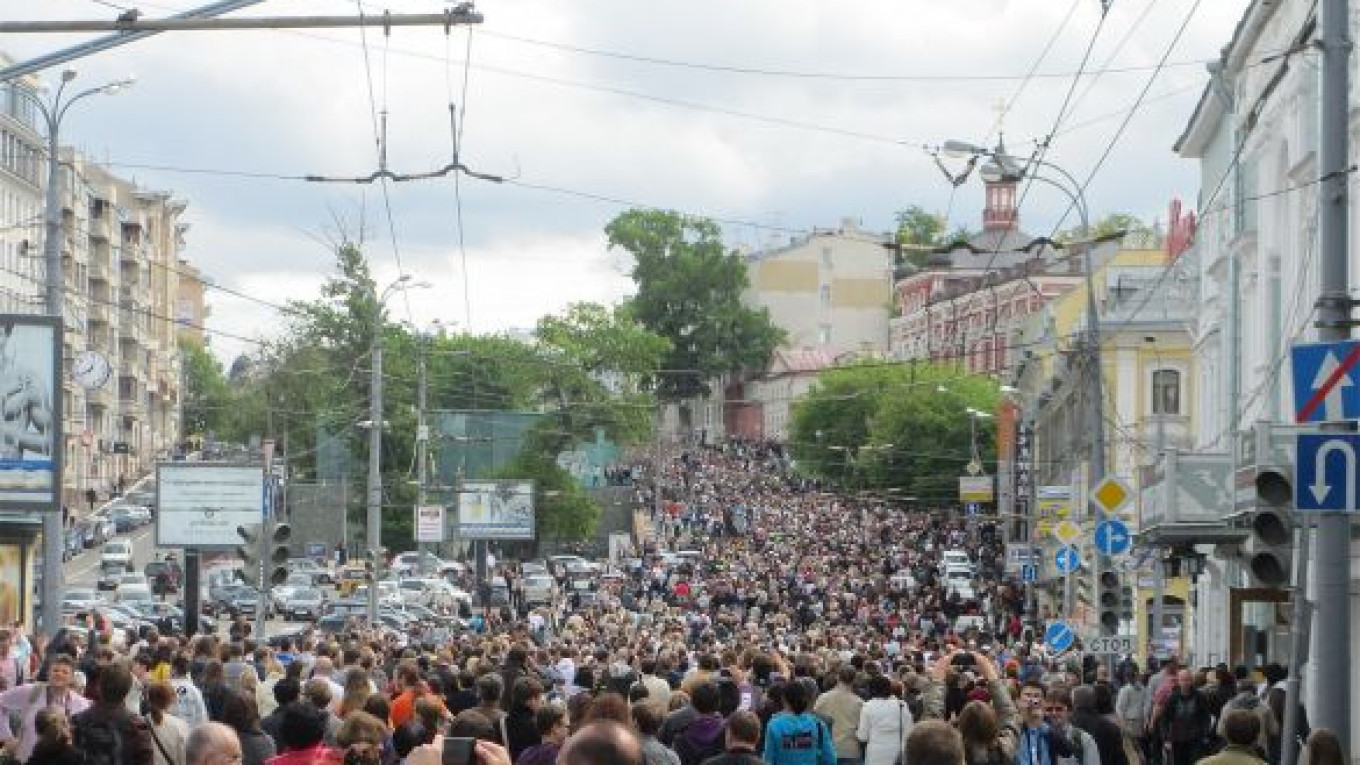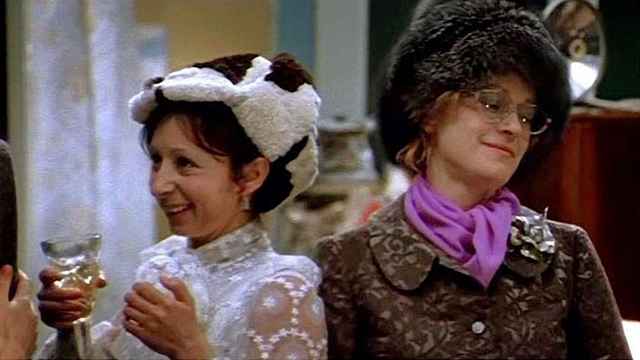Officially it was called a Test Walk With Poets and Writers. Although, I already have to back down from that. As novelist Boris Akunin stated on Dozhd television Sunday night, nothing in this May 13 march from Pushkin Square to Chistiye Prudy was organized. "It happened on its own," he said.
I can't state the name of the person who made the following comment on Facebook because it washed by me in a sea of comments I have been following for the last 20 hours. But the comment stuck in my mind: "So! Russians do read more than anyone else after all!"
That used to be the mantra in the Soviet era. It was not only an officially supported idea (yes, they used that as propaganda, too), it was true. It wasn't so much that Russians read more (although, they may have done that, too), but it was that they read the real thing: literature. You really did ride the metro or walk around city parks and see people reading Dostoevsky, Nekrasov, Gogol, Tolstoy, Chekhov, Saltykov-Shchedrin and dozens, maybe hundreds, more writers. Pushkin. Horrors. Did I forget Pushkin? We'll get to him.
The prevailing opinion is that this is no longer true. You're more likely to see someone reading a glossy magazine or a bodice ripper on the metro today. Although with the advent of Kindles, it's not always easy to know exactly what someone is reading.
But let's leave that aside. My point here is what writers wrought Sunday in Moscow. It was an astonishing turn around in a wild and often dangerous week.
Please note: Poets and playwrights and novelists did this. After watching Moscow authorities beat on people, kick them when they were down, chase them up and down the city's beautiful boulevards and arrest them with no rhyme nor reason — after a week of this, thousands of readers turned out at the invitation of writers to participate in a peaceful, friendly and festive march. It began at the foot of a statue honoring poet Alexander Sergeyevich Pushkin on Pushkin Square and concluded, more or less, at the foot of a monument honoring playwright Alexander Sergeyevich Griboyedov on Chistiye Prudy.
Look how Muscovites responded to a call from its writers to show their faith in, and desire for, peace and common sense.
The beauty of this march was its joy, its lightness and goodwill. This is what prompted Akunin to say during his talk on the Parfyonov and Pozner show on Dozhd television that, "Society has become more adult than the authorities. As I watched people, I kept thinking of the notion of 'adult.'"
Akunin, using the lovely neologism of skachkoobrazno, describes the situation of the last week as "developing in fits and starts." His point, and he makes it clearly, is that the general populace in Moscow is one or two steps ahead of the authorities. The authorities keep doing the same old stuff — seeking to repress any signs of dissent — while the people keep changing their tactics.
This is what was so important on Sunday. For the first time this week, the authorities changed their tactics. To the utter amazement of everyone — protesters and authorities alike — an enormous crowd of readers came out to join writers and peacefully say, "Enough!" They did it without making a single demand, without chanting a single slogan. They did it merely by showing up and taking a walk on one of Moscow's most attractive streets.
The authorities clearly put two and two together and smartly decided to keep their numbers to a bare minimum. There was not a storm trooper in evidence on Sunday. Just a few stray policemen doing their job quietly, keeping an eye on things to make sure all were safe.
The police closed down traffic for hours on the boulevard despite the fact that no one had requested permission for such unusual measures. More to the point, the people closed down the streets with their presence and the police, rather than take aggressive or punitive action, stepped back and let it all happen peacefully. That, folks, was the prestige and, yes, the authority of Russia's writers having its effect.
On my own personal walk, I ran into at least two dozen writers, actors and musicians, some of whom I know and some of whom I know only by name. Rock musician Andrei Makarevich was there. The artist Bilzho was there. The journalist and photographer Yury Rost was there. Playwrights were well represented by Maksym Kurochkin, Viktor Korkiya, Nina Belenitskaya, actor-playwright Sergei Yursky and others.
Kurochkin and I chatted about the incredible transformation in styles of demonstration that has taken place over the last week. "What I like most of all," Maksym said, "is the way the genre keeps changing. This has the feel of something real and substantive."
A Message from The Moscow Times:
Dear readers,
We are facing unprecedented challenges. Russia's Prosecutor General's Office has designated The Moscow Times as an "undesirable" organization, criminalizing our work and putting our staff at risk of prosecution. This follows our earlier unjust labeling as a "foreign agent."
These actions are direct attempts to silence independent journalism in Russia. The authorities claim our work "discredits the decisions of the Russian leadership." We see things differently: we strive to provide accurate, unbiased reporting on Russia.
We, the journalists of The Moscow Times, refuse to be silenced. But to continue our work, we need your help.
Your support, no matter how small, makes a world of difference. If you can, please support us monthly starting from just $2. It's quick to set up, and every contribution makes a significant impact.
By supporting The Moscow Times, you're defending open, independent journalism in the face of repression. Thank you for standing with us.
Remind me later.







